You followed a process to become a physician. This is the process you will follow to achieve your successful nonclinical career transition.
Phase I - During Your NonClinical Career Diagnosis™
(offered Online or in my Denver office):- Our focus will be defining your career objectives - exploring different jobs, careers, occupations or entrepreneurial pursuits and deciding on a primary area of pursuit.
- Creating a career transition action plan. Career change requires a plan. What do you need to do, who do you need to meet, what documentation of your abilities will you need and how long should it take? These are issues we will discuss and reach initial conclusions before we end our meeting.
- What's the value of a Career Diagnosis? In a word, Focus. I speak with physicians interested in career change every day, and the first question I always ask is, "What do you want to do." The answers range from work in pharma to perhaps insurance, or to create a good EMR/EHR... but the most common answer is, "I'm not really sure. I don't know what's out there." May answer to that is this. You need to know what you want before you worry about what's out there, and that's the value of your Career Diagnosis. A successful career is about you, not just about what's out there.
Phase II - Developing your Campaign Materials - Your "Brand":
The next step is preparing the Campaign Materials, establishing your new brand and your value proposition. This is when we determine the materials appropriate to your transition campaign and this Phase usually requires six to eight weeks to complete. We'll decide what materials you will need to assist your transition. Remember, your CV presents you strictly in the practice of medicine. Non clinically, you will need documents that present you as a problem solver in your chosen field.Consider these Campaign Materials to select from based on your area of focus:
- Resume
- Cover letters
- Stump speech
- Telephone scripts
- Business cards
- Face sheet
- Web site
- Business plan
- PowerPoint® presentation
- Brochure
- Demo Disc
Further, we'll discuss how to use these documents and materials effectively. Non clinically I'll recommend you use documents with much greater discretion than you would use your CV when looking or a clinical job. My constant admonition is that if you are offered a new opportunity using nothing more than your business card, you've probably secured the best possible position.
All services are also available ala carte if you wish a less structured approach or see a need for only select services. Click Here for a list and fees.
Phase III - Plan Implementation:
I have a singular objective in this phase. I want to help you enter the room with the people you want to be working with or for. Whether literally or virtually, I want to help you get the chance you want to present your value to the right people. I often describe this phase as much akin to a political campaign, where your are the candidate and I am your campaign manager. My job is to help you stay on message, to keep your focus, to evaluate the many conversations you will have and to adapt your campaign appropriately as you progress.This phase may last from nine to 12-14 months. That's right, expect a many-month process to achieve the success you want. Again, from my background, I know, if you were searching for a clinical job, you'd expect no more than a month or so to lock down a new contract. Consider two critical differences. First, you're not just changing jobs, you are changing careers. And your expertise is not automatic, it requires discussion and validation. Second, realize you'll be hired based on your ability to solve organizational problems, provide leadership and bring new thinking into play. Contrast that with being hired for a clinical post - you're mostly there to "produce'' - to see patients or perform procedures. The evaluation process is quite different - particularly in the are of team work and being about to be a part of the larger group. Those issues usually aren't as highly valued in practice.
Also, using a clinical analogy, consider this phase similar to treatment management. Managing a treatment process, while focused on a definable outcome or range of outcomes, is still fluid and dynamic based on how the patient responds to treatment and the individual patient's response matches to outcomes. You alter meds, change therapies and make other modifications based on real-time data. We do the same during Plan Implementation. It is fluid and dynamic, but just like treating your patient, modification always need to be made with an eye towards our target outcomes.
As Phase III draws to a close, our focus will shift to evaluating your offers, reviewing income, assessing the value of your "total package."
And what ties this all together - career management, a trusted career advisor to help you stay focused, stay on message, follow your plan and evaluate the milestones of your success.

